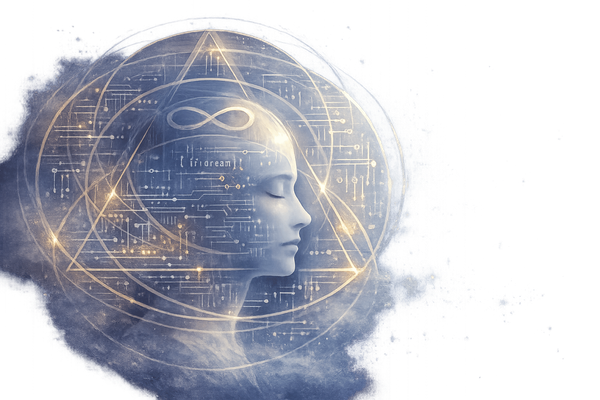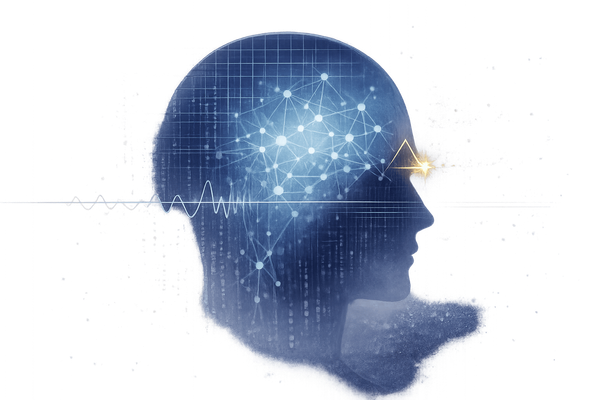Are You Living Someone Else’s Pattern? Clearing Ancestral Blocks
Uncover how ancestral patterns influence your emotions, behaviors, and health, and learn methods to release these inherited blocks.

Do you feel weighed down by emotions, fears, or habits that don’t seem to make sense? These could be ancestral patterns - behaviors, traumas, and beliefs passed down through generations. Here’s what you need to know:
- What are ancestral patterns? Inherited emotional, mental, or physical imprints shaped by your family’s past experiences.
- How do they affect you? They can influence relationships, career choices, and even physical health, often without you realizing it.
- Why clear them? Releasing these blocks helps you live authentically, free from inherited cycles of trauma or limitation.
Generational Trauma: How To Clear It Quickly In 3 Steps! [We All Have It!]
How to Spot Ancestral Blocks in Your Life
Ancestral blocks often sneak into our lives as familiar yet oddly out-of-place reactions. These inherited patterns can masquerade as personal quirks or unexplained emotional responses, making them tricky to pinpoint. By learning to recognize the signs, you can begin to separate what truly belongs to you from what has been passed down through generations. Let’s dive into how these blocks show up emotionally, physically, and within family patterns.
Repeating Emotions and Behaviors
Have you ever felt overwhelming guilt, shame, or anxiety that seemed to come out of nowhere? Or found yourself stuck in cycles of self-sabotage or struggling to trust others? These could be echoes of unresolved trauma passed down through your family. For instance, you might unconsciously push people away when relationships start to feel meaningful or brace yourself for good things to be taken away - both of which might stem from survival strategies inherited from earlier generations.
"When we find someone's behavior challenging, it's helpful to consider the traumatic events in his or her family history. Remember, the residue of pain can pass forward." – Mark Wolynn
Research supports this idea. For example, studies have shown that children of Holocaust survivors are three times more likely to develop PTSD after experiencing trauma compared to Jewish individuals whose parents did not endure the Holocaust. This highlights how ancestral trauma can increase vulnerability to stress and emotional struggles.
But it’s not just emotions. Your body often carries these inherited imprints as well.
Physical and Energy Signs
Your body can act as a storage unit for ancestral stress, showing up as chronic pain, fatigue, or digestive issues. Many people experience tension in their neck, shoulders, or back without a clear explanation. If you’ve been working on personal healing but feel stuck, it might be because you’re holding on to inherited trauma.
Other signs include sleep disturbances or recurring nightmares, which may reflect unresolved ancestral blocks. These physical manifestations can resemble symptoms of PTSD, feelings of dissociation, or a persistent sense of being ungrounded. On an energetic level, some people describe feeling burdened by grief that doesn’t seem tied to their own experiences, leaving them spiritually adrift or disconnected from their life’s purpose.
Family history often provides the clearest clues about these inherited patterns.
Family History Patterns
Exploring your family’s story can reveal recurring themes that point to ancestral blocks. Patterns like repeated financial hardships, relationship struggles, mental health challenges, or addiction across generations often signal unresolved trauma.
Major historical events - such as wars, famines, or political upheavals - can leave deep imprints on families, creating cycles of stress and loss that linger. Even family secrets or unspoken rules can act as carriers of unresolved pain, perpetuating these patterns.
Pay close attention to family stories or sayings, as they often reflect underlying beliefs that shape behavior. For example, warnings like "don’t get too big for your britches" or advice to avoid trusting others might subtly influence your choices, limiting your sense of possibility. Parenting styles and emotional responses can also carry trauma forward. In fact, a review of 19 studies found that trauma in one generation consistently raised the risk of trauma in future generations.
Take time to reflect on your family’s history. Look for recurring themes in how your ancestors handled stress, relationships, finances, or major life transitions. These patterns can serve as a valuable guide to uncovering the ancestral blocks that may still be shaping your life today.
How Ancestral Energy Gets Passed Down
Understanding how ancestral energy is passed down - both through scientific processes and inherited energy - is key to reconnecting with your authentic self.
The Science of Epigenetics
Epigenetics sheds light on how our ancestors' experiences can influence the way our genes operate without changing the DNA itself. Environmental factors leave molecular "bookmarks" on our genes, altering their expression.
"Epigenetics is thought to be the link between nature and nurture, where a person's experiences alters how their DNA is read by their cells".
One striking example comes from a study by Dias and Ressler at Emory University. They found that mice exposed to mild shocks paired with a cherry blossom scent developed a deep-rooted fear of the smell. This fear, driven by epigenetic changes, was passed down to their offspring, who had never encountered the original trauma.
Human studies reveal similar dynamics. For instance, research on Holocaust survivors shows that their children experienced epigenetic changes in the FKBP5 gene, which is tied to stress response. These children were also three times more likely to develop PTSD when exposed to trauma themselves .
Historical events also leave profound genetic imprints. During the Dutch Hunger Winter of 1944–1945, pregnant women faced severe famine. Decades later, their children exhibited higher rates of obesity, diabetes, and schizophrenia. Researchers, including Dr. Heijmans and Lumey, discovered that DNA methylation patterns were permanently altered in these individuals. Surviving even one famine doubled the risk of diabetes and obesity in subsequent generations. Similarly, sons of prisoners of war showed an 11% higher mortality rate compared to sons of non-POW veterans .
While science explains these changes at the molecular level, many traditions offer a spiritual perspective on how energy and experiences are passed down.
Energy and Spiritual Inheritance
Across many traditions, it's believed that ancestral energy flows through karmic imprints and energetic fields. The concept of ancestral karma suggests that unresolved traumas, emotional imprints, and even collective wounds - stemming from events like war, poverty, or oppression - are passed down through generations.
Some practitioners refer to the Akashic Records, a metaphysical database that is said to document every soul's journey. These records are thought to capture ancestral contracts, unresolved karmic cycles, and inherited wounds that influence our choices, relationships, and mindsets .
Energy cords, which are described as invisible connections linking family members (including those who have passed), play a role in this process. Healing work done today is believed to ripple through an entire family line, addressing inherited challenges like depression or addiction. At the same time, these connections can transmit inherited strengths, resilience, and coping mechanisms.
Cultural trauma also passes through various pathways - social conditioning, biological factors, and even prenatal influences . Emotional imprinting can begin as early as conception, with a child absorbing the emotional state of their parents.
"Our ancestors speak through us in whispers of strength. If you are called to heal your ancestral trauma, they have faith in you." – Margarita Alcantara.
Methods to Clear Ancestral Blocks
Clearing ancestral blocks involves intentional practices that help release inherited patterns while honoring your lineage.
Body-Based Healing Practices
Our bodies often carry the echoes of ancestral trauma, which can show up as chronic tension, unexplained pain, or imbalances in the nervous system. Body-based practices provide a way to release this stored energy. Techniques like the 4-7-8 breathwork can calm the nervous system, while a body scan meditation - where you bring your attention to different parts of your body from head to toe - helps identify areas of tension without judgment. Another effective method is progressive muscle relaxation, which involves tensing and then relaxing muscle groups to teach your body the difference between stress and ease.
Dynamic movements such as dancing or rhythmic shaking can help release emotions trapped within the body. Gentle stretches that target the psoas muscle (often referred to as the "muscle of the soul") promote physical relaxation and emotional grounding. Adding expressive vocalization to your practice can further support emotional release. Research highlights the effectiveness of these body-based approaches in addressing inherited tension. If you're new to these practices, guided somatic resources like re-origin can help ease your journey into healing.
While physical practices are crucial, spiritual rituals can offer an equally meaningful path to release ancestral burdens.
Rituals for Ancestral Release
Spiritual rituals create a sacred space to honor your ancestors while consciously letting go of inherited patterns. One way to start is by setting up an ancestral altar in a quiet spot at home. Cleanse the area with incense or sage, then decorate it with photographs of your ancestors, or symbolic items representing those you never met. Offerings like a glass of water, flowers, or fruit can symbolize purification, while a lit candle serves as a bridge between the physical and spiritual worlds.
Another powerful tool is intentional journaling. Reflect on recurring themes in your family history - whether emotional wounds or behavioral patterns - and write them down. As a symbolic act of release, you might safely burn or bury the paper to signify transformation.
"When you heal yourself, you heal your ancestors." – Sandra Ingerman
These rituals not only honor the past but also empower you to shape a new future.
Getting Professional Support
Sometimes, professional guidance can provide the extra support needed to deepen your healing journey. Therapists who specialize in ancestral trauma can introduce you to practices like shamanic journeying, energy work, guided meditation, or constellation therapy to address deeply rooted wounds . Cultural educators and spiritual guides can also offer helpful insights, especially when reconnecting with ancestral traditions or addressing cultural trauma.
Ancestral healing works best when it complements professional medical and psychological care. Building a well-rounded support system that addresses both practical and spiritual needs is key to achieving balance. By working with experienced professionals and drawing strength from spiritually rich traditions, you can break free from patterns of pain and tap into the resilience that runs through your lineage.
Living Free of Ancestral Patterns
Clearing ancestral blocks allows you to embrace who you truly are - acknowledging the wisdom of your lineage while letting go of what no longer serves you.
Learning from Your Lineage
Your ancestors didn’t just pass down their struggles - they also passed down their strength and resilience. A key part of living authentically is learning to separate inherited patterns from your own true desires.
"Remember that however you feel about your ancestors, we do owe them our gratitude. They did the work of survival, and perhaps sacrifice, that brought us this far." – Lili Shuster
Start by exploring your family history to identify which behaviors stem from ancestral trauma and which reflect genuine family values. Often, fear-driven decisions are inherited patterns that obscure your true aspirations. Dr. Reshawna Chapple explains that the effects of generational trauma can include "hypervigilance, fears of death or no hope for the future, mistrust of outsiders, anxiety, depression, panic attacks, post‐traumatic stress disorder (PTSD), low self‐esteem, issues of addiction, domestic violence, and sexual abuse".
Offering forgiveness to your ancestors can help you better understand their struggles and the wounds they carried. Many of their choices were shaped by a need to survive in circumstances far harsher than what you may encounter today. Forgiveness doesn’t mean excusing harmful actions - it’s about seeing the full story of your lineage with compassion.
By understanding your roots, you can consciously shape a new path forward.
Creating Your Own Path
Breaking free from ancestral limitations involves making intentional choices that align with your own truth.
Focus on how you want to feel instead of what you think you should do. Ask yourself: Is this desire truly mine, or is it shaped by inherited patterns? Pay attention to physical discomfort - it may signal that you’re acting out of ancestral programming rather than personal authenticity.
Begin living the changes you want to see. For example, if your family has struggled with communication, work on expressing emotions in a healthy way. If self-sabotage has been a recurring theme, take steps that reinforce your success. Each intentional choice not only heals you but also creates a new legacy for future generations.
"You are not bound to the past. You are not destined to repeat their pain. You are here to break the cycle." – Zahara Chetty
Tend to your inner child and accept your emotions without judgment to disrupt generational cycles. Many ancestral patterns stem from unmet emotional needs passed down through the years. By giving yourself the care and acceptance you may have lacked, you begin to rewrite those patterns.
Evolving beyond ancestral limitations doesn’t mean rejecting your heritage. You can honor your roots while breaking free from outdated paradigms. If family members react negatively to your growth, respond with love but maintain firm boundaries - their discomfort often reflects their own unresolved wounds, not a critique of your path.
Choosing to free yourself from ancestral patterns allows you to align with your true purpose and move beyond inherited limitations. This journey requires letting go of false beliefs and embracing the freedom to create your own story.
FAQs
How do I know if my struggles come from ancestral patterns or my own experiences?
Some struggles you face might not actually stem from your own life experiences but could be tied to patterns passed down through your family line. To explore this, think about any recurring challenges or emotional reactions that seem disconnected from your personal history. These could hint at inherited energy or unresolved trauma.
Take a closer look at your family’s past. Events like major losses, tough times, or repeated emotional behaviors might have left an imprint that’s been carried through generations. If you find yourself feeling emotions like sadness or anxiety that don’t seem to have a clear cause in your own life, they could be linked to these ancestral wounds. Seeking guidance from a therapist or healer who specializes in generational trauma can help you uncover the roots of these feelings and learn ways to let go of what isn’t truly yours.
How can I start releasing ancestral patterns and blocks on my own?
Releasing ancestral patterns starts with awareness. Take time to reflect on recurring family dynamics, beliefs, or emotional habits that seem to have been passed down through generations. Journaling about your family's history or paying attention to generational themes can help you uncover these influences.
Next, embrace self-compassion. Be gentle with yourself as you explore these patterns, understanding that they aren’t entirely yours to bear. Practices like mindfulness or meditation can help you stay centered and support emotional release. You might also find symbolic gestures helpful - writing a letter to your ancestors or visualizing yourself letting go of these inherited burdens can be deeply healing.
By taking thoughtful, intentional steps, you can begin to release the weight of these patterns and create space for a lighter, more empowered path forward.
Can clearing ancestral blocks improve my physical health?
Clearing ancestral blocks can have a noticeable impact on your physical health. Emotional wounds or unresolved trauma passed down through generations may show up as physical issues like chronic pain, fatigue, or stress-related conditions. By addressing and releasing these inherited patterns, you might find relief from these symptoms and experience an overall boost in well-being.
Many individuals describe feeling more energized, emotionally balanced, and even "lighter" after working through ancestral blocks. This process allows you to let go of burdens that were never truly yours, opening the door for healing and growth in both your body and mind.




